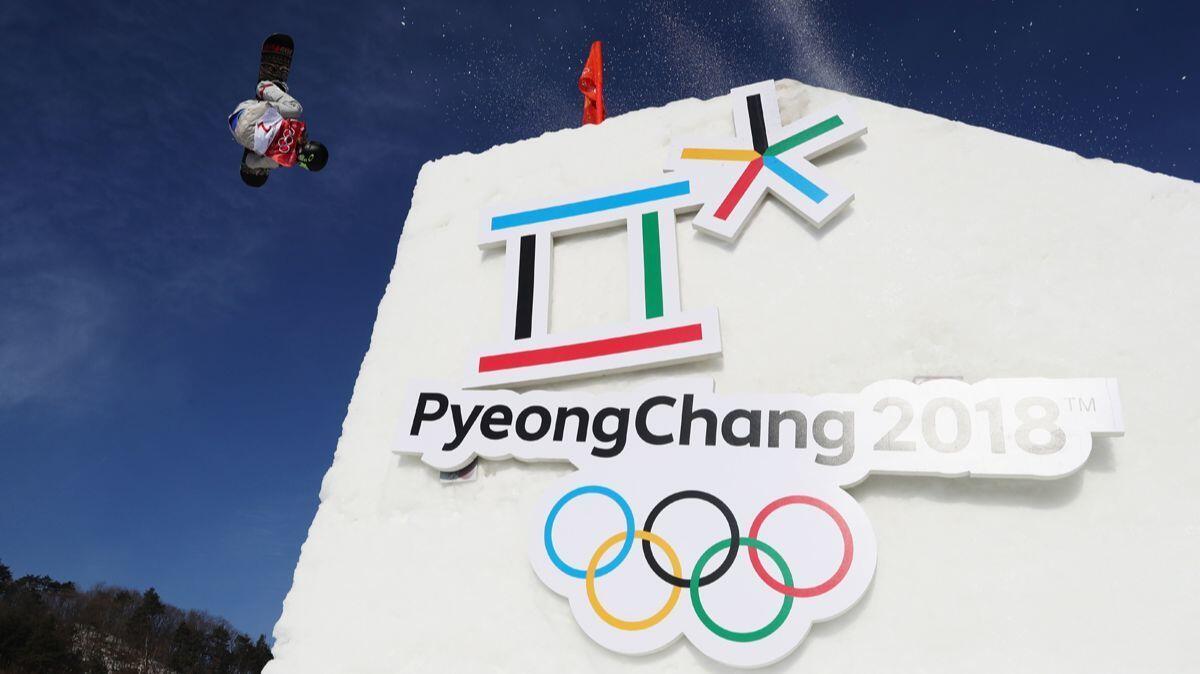Incense, meditation, yoga and gold medals. All in a day’s work for Jamie Anderson
- Share via
Reporting from PYEONGCHANG, South Korea — It’s amazing, really, that U.S. snowboarder Jamie Anderson has set off a hotel room smoke detector only once.
“They totally understood,” Anderson says. “They were like, ‘Incense? OK. Purify the space.’ ”
And that, in a nutshell, is what Anderson is all about: purifying the space, in her sport, in her life, in everyone else’s life. The profile message on her Instagram page says “Free Spirit” first, before it says two-time Olympic gold medalist.
She won one in slopestyle in 2014 in Sochi and repeated last week in Pyeongchang. Wednesday night (PST) at Phoenix Snow Park, she goes for a third in the new snowboard event of big air, where you are scored on a single, prodigious, hellacious jump.
Anderson will get ready by having one of her “really good green drinks” with Dragon Herbs’ Tonic Alchemy, an organic powder with 91 ingredients that includes Siberian Chaga, Cordyceps mycelium, Changbai Mountain Schizandra and Himalayan Rhodiola sacra. She’ll mix it with goji berries and a banana.
Then she’ll create a makeshift altar with quartz crystals, a piece of bark, a small Buddha and her Hawaiian tiki man. Light some incense and candles. Put on her molla beads. Do some yoga and meditate. Maybe sip some herbal tea and write in her journal.
“Sometimes if I’m really afraid,” Anderson says, “depending on where I am, I’ll take a run in the trees and just calm down.”
She likes trees. Photos of her in them or under them or gazing up at them populate her social media accounts, including one of her hanging from a branch of one in Carlsbad last March.
“They call me the tree hugger and this or that,” Anderson says, laughing. “I’m like, ‘At least I’m happy. I don’t really care.’ ”
There are few more successful athletes in these Olympics, and few more unique. And the latter may have something to do with the former, an ability to tune out pressure and focus the mind in the present, put herself “in my own little sacred place” that melts limits and blurs boundaries of performance.

The women’s slopestyle event here was buffeted by heavy winds that led to one crash after another and had athletes worrying more about safety than scores. Anderson, somehow, blocked it all out and stayed on her feet to become a rare repeat Olympic gold medalist.
Or as she likes to put it. “Do your best and bless the rest.”
It’s what happens when you’re one of eight kids home-schooled by hippie parents in South Lake Tahoe, encouraged to use the outdoors as their classroom. They didn’t watch TV. They didn’t take antibiotics growing up and fortified their immune systems with holistic remedies.
“I wanted them to be like children, playing outside, running and jumping and not sitting inside at a desk,” Lauren Anderson, her mother, told NBC’s “Today” a few years ago. “They got to be free, building their bodies, protecting their spirits and minds, and not being pushed or pressured. There wasn’t a big push for them to read and write and do arithmetic. I wanted them to learn how to get along and let life be the teacher.
“Character-building was more important than academics.”
Jamie says she’ll do it, if possible, when she starts a family.
“I think that has cultivated who I am today,” she says, “because I got to tap into my own passions and purpose at a young age, and I wasn’t stuck in a school room being ADD and crazy. I think kids need that freedom to understand who they are.”
Her father, Joey, is a self-professed “hippie” who grew up in the San Francisco Bay Area in the 1960s. Lauren recently moved to Hartland, Vt. (population: 3,393), where she has an alpaca farm and sells clothing made from the wool.
Their 27-year-old daughter eats ancient grains and organic vegetables, cooks with turmeric, ginger and ghee. She rubs essential oils on herself to calm the central nervous system. She fills her water bottle from natural springs and skinny dips in frigid mountain streams. She knits. She rides her skateboard through airports and hopes the smoldering incense doesn’t set off smoke detectors.
She talks about spreading positive energy in the universe, connecting with Mother Nature, achieving inner consciousness, peace and serenity, love and compassion.
She openly criticizes the direction of slopestyle as “pretty whack,” becoming more gymnastics than artistry, more slope than style, with riders practicing jumps into air bags (which she abhors). She’d prefer to take her tricks to the Alaskan back country and “ride on natural features.”
Bubbling beneath the surface, though, is a contradiction. A battle.
“It’s very interesting,” Anderson says, “to balance the conscious, grounded part of myself with fierce competitor. I think I’ve gotten a little more relaxed as I’ve gotten older. And more peaceful. I want to be a peaceful warrior. I don’t want to be me, me, me, ego, the best. And that might be what separates me, trying to be less attached to the outcome.
“The times when I’m more concerned about winning and trying too hard, it doesn’t usually work out. I try to enjoy the process and just do whatever I want to do for myself — not, I need to beat her or I need to do this. It’s so hard to balance that ego and competitive part with your soul and your spirit.”
It hits when she stands on her snowboard at the top of the run, staring down at massive jumps that could kill her, at a scoreboard that will determine winners and losers, at five interlocking rings, at an expectant crowd.
Her response: She starts dancing.
More to Read
Go beyond the scoreboard
Get the latest on L.A.'s teams in the daily Sports Report newsletter.
You may occasionally receive promotional content from the Los Angeles Times.






